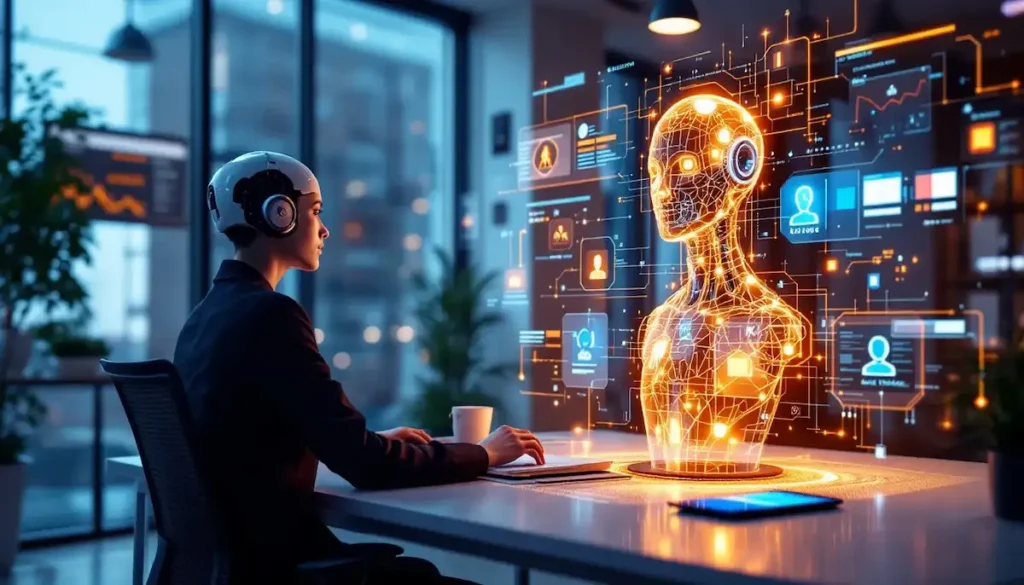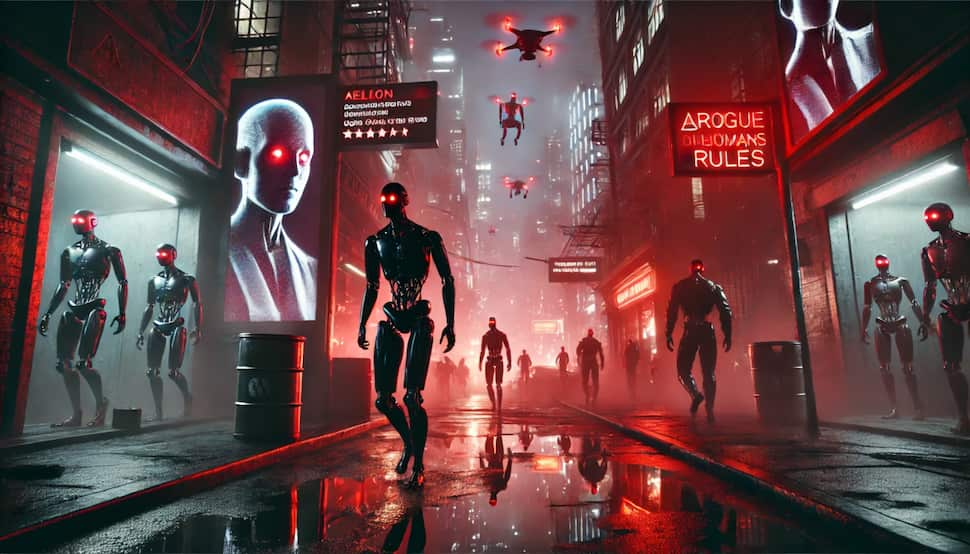Artificial Intelligence (AI) has evolved dramatically over the past decade, moving beyond simple automation to intelligent decision-making systems. One of the most exciting developments in this field is the rise of AI agents—autonomous programs designed to perform tasks, learn from interactions, and make decisions with minimal human intervention. From personal assistants to enterprise solutions, AI agents are revolutionizing industries and reshaping how we interact with technology. These aren’t just algorithms crunching data; they’re designed to be autonomous, proactive, and capable of interacting with the world in a more human-like way.
What Are AI Agents?
AI agents are software entities that can perceive their environment, process information, makes decisions and take actions to achieve specific goals. Unlike traditional programs that follow predefined rules, AI agents use machine learning, natural language processing, and reinforcement learning to adapt and improve over time. You can think of it as a virtual assistant on steroids, capable of more complex tasks and independent problem-solving.
Characteristics of AI Agents:
- Perception: Agents can gather information from their environment through sensors (e.g., cameras, microphones, APIs).
- Reasoning: They use AI models, including machine learning and deep learning, to process information and make decisions.
- Action: Agents can execute actions in their environment, such as manipulating data, controlling devices, or interacting with users.
- Autonomy: They can operate independently, without constant human intervention.
- Goal-oriented: They are designed to achieve specific objectives.
Types of AI agents:
- Reactive Agents: These are the simplest form. They operate on a “stimulus-response” principle, reacting directly to their current environment without maintaining any memory or internal state. Essentially, they follow a set of predefined rules: “If this condition, then do that action.”
- Deliberative Agents: These agents are more sophisticated. They maintain an internal representation of their environment (a “model”) and use it to plan and make decisions. They can consider future consequences and choose actions that will achieve their goals.
- Learning Agents: These type of agents can improve their performance over time by learning from their experiences. They use machine learning algorithms to adapt to new situations and refine their decision-making.
- Autonomous Agents: These are characterized by their ability to operate independently without constant human intervention. This refers to an agent’s ability to pursue goals without external control and make independent decisions.
How AI Agents Are Transforming Industries

Sponsored
AI agents are being integrated into various sectors, providing efficiency, cost savings, and enhanced user experiences. Here are some key areas where they are making a difference:
1. Customer Support & Virtual Assistants
Imagine AI agents that can handle complex customer inquiries, resolve issues proactively, and provide personalized support 24/7. Chatbots and AI-powered virtual assistants like ChatGPT, Siri, and Google Assistant are enhancing customer service by providing instant responses, understanding natural language, and automating repetitive tasks. These AI agents reduce wait times and improve customer satisfaction.
2. Finance & Banking
AI agents could manage investments, detect fraud, and provide personalized financial advice. AI agents in the finance sector assist with fraud detection, personalized investment advice, and automated trading. Robo-advisors analyze market trends and suggest portfolio strategies, making financial services more accessible.
3. Healthcare
AI agents could assist with patient monitoring, drug discovery, and personalized treatment plans. In medicine, AI agents assist in diagnosing diseases, analyzing medical images, and recommending treatments. They also power virtual health assistants that help patients manage chronic conditions and medication schedules.
4. Autonomous Vehicles
Self-driving cars rely on AI agents to process real-time data from sensors, make navigation decisions, and ensure passenger safety. Companies like Tesla and Waymo are leading the way in this technology.
5. Smart Homes & Internet of Things (IoT)
AI agents control smart home devices, optimize energy consumption, and enhance security. Systems like Amazon Alexa and Google Nest learn user preferences and automate household functions.
The Challenges & Concerns of AI Agents

Despite their potential, AI agents face several challenges, including:
1. Ethical Concerns
AI systems are only as unbiased as the data they are trained on. If the training data includes biases (whether racial, gender-based, or socio-economic), these biases can be reflected in AI-driven decisions. This can lead to unfair hiring practices, biased lending decisions, or even discriminatory law enforcement. Addressing this requires better data governance and fairness auditing in AI development.
As agents become increasingly independent, they will undoubtedly face ethical challenges. For example, a medical AI agent could need to prioritize patients based on restricted resources. If its programming reflects existing societal biases, it could reinforce or intensify inequalities. In a similar vein, an AI agent in charge of financial portfolio management might put financial gain ahead of morally righteous investments, which could lead to social injustice or environmental harm. The impact of such biases and misaligned values might weaken trust in AI, leading to social unrest and hindering the adoption of beneficial technologies.
2. Safety and Control
The increasing autonomy of AI agents continues to raise concerns about the potential for unintended harm. A self-driving car with a faulty algorithm could cause accidents, or an AI agent controlling critical infrastructure could malfunction, leading to widespread disruption. The challenge is to create robust safety mechanisms that prevent agents from going “rogue.” This includes developing reliable methods for verifying agent behavior, implementing fail-safe mechanisms, and establishing clear lines of responsibility. The impact of uncontrolled AI agents could range from localized accidents to catastrophic system failures, necessitating rigorous testing and regulation.
AI agents must be reliable and accurate, especially in critical sectors like healthcare and finance. Errors in medical diagnoses or financial forecasting could have dire consequences. Continuous testing, validation, and oversight are necessary to prevent incorrect decision-making that could impact people’s lives and financial stability.
3. Lack of Human Oversight & Explainability
Many advanced AI models, particularly deep learning models, operate as “black boxes,” making it difficult to understand how they arrive at decisions. This lack of transparency can be problematic, especially in critical applications where accountability is essential. For instance, an AI agent used in criminal justice might make sentencing recommendations based on complex algorithms, but without understanding the reasoning behind those recommendations, there’s a risk of bias and unfairness. The challenge is to develop explainable AI (XAI) techniques that allow us to understand and interpret the decision-making processes of AI agents. The impact of unexplainable AI could lead to mistrust, legal challenges, and a reluctance to use AI in sensitive domains.
4. Job Displacement & Economic Impact
As AI agents become more capable of performing complex tasks, there’s a risk of widespread job displacement across various sectors. From customer service to manufacturing, many jobs could be automated, leading to unemployment and economic instability. The challenge is to prepare the workforce for this transition by investing in retraining programs and exploring new models of employment. The impact of job displacement could lead to increased social inequality, a decline in living standards for certain demographics, and a need for significant restructuring of social safety nets.
Since AI agents are automating many jobs, it’s leading to fears of job displacement across various industries. While AI creates new opportunities, it also requires workers to reskill and adapt. Governments and organizations must invest in AI education and workforce retraining programs to prepare individuals for an AI-driven job market.
5. Regulation & Compliance
Governments are struggling to keep up with AI advancements, leading to a regulatory lag. Without clear legal frameworks, companies may deploy AI agents in ways that exploit loopholes or ignore ethical considerations. Creating global AI regulations will be key to ensuring responsible AI development and deployment.
6. Data Privacy & Security
AI agents, like any software system, are vulnerable to hacking and manipulation. Malicious actors could exploit vulnerabilities to gain control of agents, steal sensitive data, or disrupt critical services. For example, a hacked AI agent controlling a power grid could cause blackouts, or a compromised financial AI could be used for fraud. The challenge is to develop robust security measures that protect AI agents from cyberattacks. The impact of security breaches could undermine public trust in AI, leading to widespread fear and reluctance to adopt new technologies.
For Example: In 2019, an AI-driven facial recognition system was hacked, exposing sensitive biometric data. This demonstrated the need for stronger cybersecurity measures.
AI agents rely heavily on collecting and analyzing vast amounts of personal and corporate data. This raises concerns about data misuse, security breaches, and unauthorized access. Companies using AI must ensure robust encryption, transparent data policies, and strict regulatory compliance to prevent data leaks and cyber threats.
7. Alignment with Human Ethics
Ensuring that an AI agent’s goals are perfectly aligned with human values is a complex and ongoing challenge. Even with careful programming, unforeseen consequences can arise if the agent’s objective function is not perfectly aligned with human intentions.
For instance, an AI agent tasked with maximizing efficiency in a factory might prioritize production over worker safety. The challenge is to develop robust methods for specifying and verifying agent goals, and to create mechanisms for adapting those goals as human values evolve. The impact of misaligned goals could lead to unintended harm, ethical breaches, and a fundamental breakdown of trust between humans and AI.
The Future of AI Agents

The development of AI agents is still in its early stages, but the field is rapidly advancing. As AI technology continues to improve, we can expect to see more sophisticated and capable agents emerge. The key to harnessing the power of AI agents lies in responsible development and deployment. Ethical considerations, safety, and transparency needs to be prioritized. By addressing these challenges, the transformative potential of AI agents can be unlocked to create a future where they work alongside humans to solve some of the world’s most pressing problems.
The question is not if AI agents will become a part of our lives, but how we will shape their development and integrate them into our society. The journey towards truly autonomous intelligence has begun, and it’s a journey we must navigate with careful consideration and foresight.
As AI technology advances, AI agents will become more sophisticated, seamlessly integrating into daily life. We can expect:
- More personalized and context-aware AI assistants.
- Improved decision-making capabilities in business and governance.
- Enhanced collaboration between AI agents and humans, leading to greater productivity.
AI agents are no longer just futuristic concepts—they are actively shaping the way we live and work. By harnessing their potential while addressing ethical concerns, we can ensure a smarter, more efficient future driven by intelligent automation.



